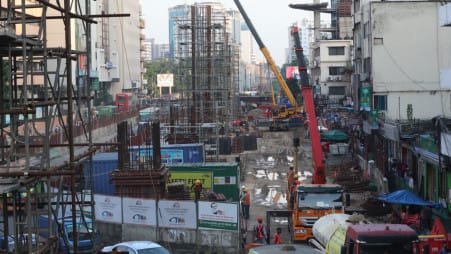By virtue of government policy support, foreign companies are getting the upper hand over their local peers on contracting opportunities
It is high time the government undertake policy reform to cut reliance on foreign construction firms and pave the way for local companies to gain a foothold in the industry, according to experts.
They said that by virtue of government policy support, foreign companies are getting the upper hand over their local peers on contracting opportunities.
Experts discussed this and other relevant matters at a webinar titled “Infrastructure development: Local contractors fall behind due to lack of policy support.
An energy magazine, Energy and Power, hosted the event on Saturday, moderated by the editor, Mollah Amzad.
Planning Minister MA Mannan attended the event as the chief guest.
In his address, the planning minister said the government would reform all relevant policies to engage local contractors in infrastructure development.
“We need to achieve self-reliance in the construction sector. To this end, the government will provide assistance to domestic construction firms,” he suggested.
Mannan said foreign contractors are hired for construction as per the requirements of development partners.
“The consulting firms prepare tender proposals in a way that local companies cannot participate in the bid. We have to take concrete initiatives to change this,” he added.
Abul Kalam Azad, former chief secretary to the prime minister, said various regulations, including tax policy, should be updated, in order to give opportunities to domestic construction companies.
He suggested forming a taskforce in this regard.
“The development partners flatter the strong and tyrannise the weak,” Kalam said.
Former chairman of the Board of Revenue Abdul Majid said foreign companies receive tax exemption, unlike their local peers.
Majid suggested that tax must be imposed, even if the government does end up paying taxes on behalf of foreign entities.
Ahsan H Mansur, executive director, Policy Research Institute, said, “We now need to build infrastructure like the developed world.”
To achieve this, the technical skills of local contractors need to be enhanced by jointly working with foreign organisations, suggested the researcher.
Drawing on practical examples, he said Chinese contractors are the first to offer lower rates; later, they increase their expenditure three to four times in one year – a practice, which is less common amongst contractors from Japan or other countries.
“This issue needs to be addressed. We need to design our projects in a way that the plan doesn’t suddenly change, and the cost doesn’t go up several times in the middle of the work,” he maintained.
To ensure the quality of the construction work, local contractors should also be held accountable, Mansur suggested.
Mir Nasir Uddin, former president of FBCCI, said that there was a time when a lot of construction work in Bangladesh was done by local contractors; lately, work seems to be going to their Chinese counterparts.
“Foreign contractors are being hired as sub-contractors. We must stop this practice,” he added.
Shishir Kanti, additional chief engineer, Roads and Highways Department, said foreign consultants specifically create tender conditions to exclude local contractors from jobs.
“If we want to get out of this situation, we must create a state-owned consulting firm,” suggested the engineer.
President of Bangladesh Association of Construction Industry, SM Khorshed Alam presented the keynote address at the event.
He observed that Chinese and Indian companies are leading the way in construction work in Bangladesh.
The weaknesses of local construction firms need to be addressed in order to cut reliance on foreign firms, added Khorshed.

